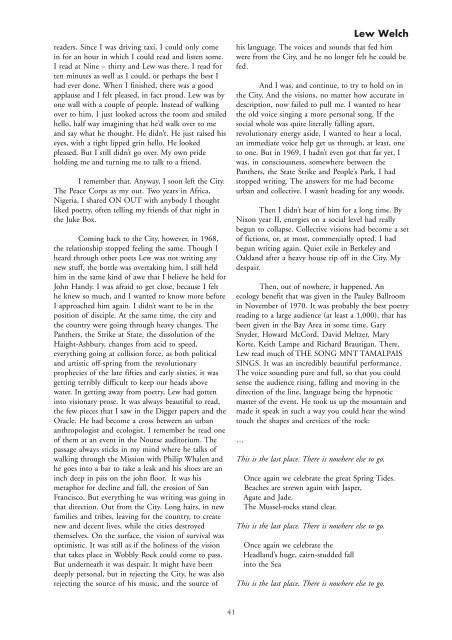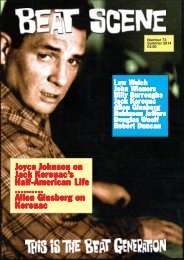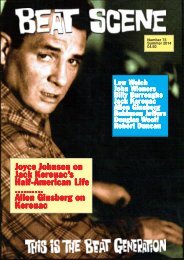You also want an ePaper? Increase the reach of your titles
YUMPU automatically turns print PDFs into web optimized ePapers that Google loves.
eaders. Since I was driving taxi, I could only come<br />
in for an hour in which I could read and listen some.<br />
I read at Nine – thirty and Lew was there. I read for<br />
ten minutes as well as I could, or perhaps the best I<br />
had ever done. When I finished, there was a good<br />
applause and I felt pleased, in fact proud. Lew was by<br />
one wall with a couple of people. Instead of walking<br />
over to him, I just looked across the room and smiled<br />
hello, half way imagining that he’d walk over to me<br />
and say what he thought. He didn’t. He just raised his<br />
eyes, with a tight lipped grin hello. He looked<br />
pleased. But I still didn’t go over. My own pride<br />
holding me and turning me to talk to a friend.<br />
I remember that. Anyway, I soon left the City.<br />
The Peace Corps as my out. Two years in Africa,<br />
Nigeria, I shared ON OUT with anybody I thought<br />
liked poetry, often telling my friends of that night in<br />
the Juke Box.<br />
Coming back to the City, however, in 1968,<br />
the relationship stopped feeling the same. Though I<br />
heard through other poets Lew was not writing any<br />
new stuff, the bottle was overtaking him, I still held<br />
him in the same kind of awe that I believe he held for<br />
John Handy. I was afraid to get close, because I felt<br />
he knew so much, and I wanted to know more before<br />
I approached him again. I didn’t want to be in the<br />
position of disciple. At the same time, the city and<br />
the country were going through heavy changes. The<br />
Panthers, the Strike at State, the dissolution of the<br />
Haight-Ashbury, changes from acid to speed,<br />
everything going at collision force, as both political<br />
and artistic off-spring from the revolutionary<br />
prophecies of the late fifties and early sixties, it was<br />
getting terribly difficult to keep our heads above<br />
water. In getting away from poetry, Lew had gotten<br />
into visionary prose. It was always beautiful to read,<br />
the few pieces that I saw in the Digger papers and the<br />
Oracle. He had become a cross between an urban<br />
anthropologist and ecologist. I remember he read one<br />
of them at an event in the Nourse auditorium. The<br />
passage always sticks in my mind where he talks of<br />
walking through the Mission with Philip Whalen and<br />
he goes into a bar to take a leak and his shoes are an<br />
inch deep in piss on the john floor. It was his<br />
metaphor for decline and fall, the erosion of San<br />
Francisco. But everything he was writing was going in<br />
that direction. Out from the City. Long hairs, in new<br />
families and tribes, leaving for the country, to create<br />
new and decent lives, while the cities destroyed<br />
themselves. On the surface, the vision of survival was<br />
optimistic. It was still as if the holiness of the vision<br />
that takes place in Wobbly Rock could come to pass.<br />
But underneath it was despair. It might have been<br />
deeply personal, but in rejecting the City, he was also<br />
rejecting the source of his music, and the source of<br />
his language. The voices and sounds that fed him<br />
were from the City, and he no longer felt he could be<br />
fed.<br />
And I was, and continue, to try to hold on in<br />
the City. And the visions, no matter how accurate in<br />
description, now failed to pull me. I wanted to hear<br />
the old voice singing a more personal song. If the<br />
social whole was quite literally falling apart,<br />
revolutionary energy aside, I wanted to hear a local,<br />
an immediate voice help get us through, at least, one<br />
to one. But in 1969, I hadn’t even got that far yet, I<br />
was, in consciousness, somewhere between the<br />
Panthers, the State Strike and People’s Park, I had<br />
stopped writing. The answers for me had become<br />
urban and collective. I wasn’t heading for any woods.<br />
Then I didn’t hear of him for a long time. By<br />
Nixon year II, energies on a social level had really<br />
begun to collapse. Collective visions had become a set<br />
of fictions, or, at most, commercially opted. I had<br />
begun writing again. Quiet exile in Berkeley and<br />
Oakland after a heavy house rip off in the City. My<br />
despair.<br />
Then, out of nowhere, it happened. An<br />
ecology benefit that was given in the Pauley Ballroom<br />
in November of 1970. It was probably the best poetry<br />
reading to a large audience (at least a 1,000), that has<br />
been given in the Bay Area in some time, Gary<br />
Snyder, Howard McCord, David Meltzer, Mary<br />
Korte, Keith Lampe and Richard Brautigan. There,<br />
Lew read much of THE SONG MNT TAMALPAIS<br />
SINGS. It was an incredibly beautiful performance.<br />
The voice sounding pure and full, so that you could<br />
sense the audience rising, falling and moving in the<br />
direction of the line, language being the hypnotic<br />
master of the event. He took us up the mountain and<br />
made it speak in such a way you could hear the wind<br />
touch the shapes and crevices of the rock:<br />
…<br />
This is the last place. There is nowhere else to go.<br />
Once again we celebrate the great Spring Tides.<br />
Beaches are strewn again with Jasper,<br />
Agate and Jade.<br />
The Mussel-rocks stand clear.<br />
This is the last place. There is nowhere else to go.<br />
Once again we celebrate the<br />
Headland’s huge, cairn-studded fall<br />
into the Sea<br />
Lew Welch<br />
This is the last place. There is nowhere else to go.<br />
41





